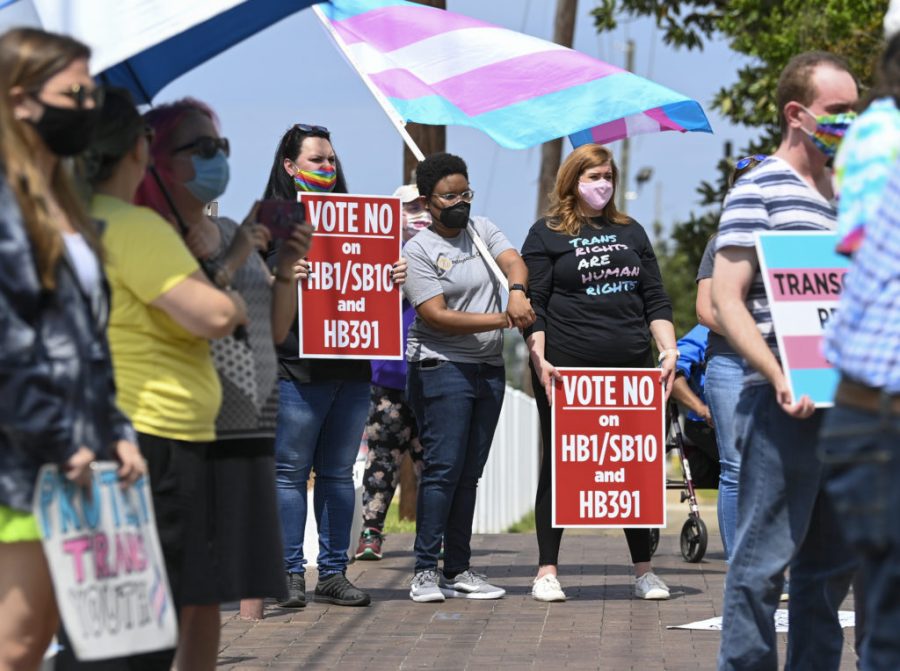Anti-Transgender Laws
June 23, 2021
Equality seems like a term that is thrown around a lot when discussing America. We always hear how much we need to fight for equality as well as how much America has improved on achieving equality. But time and time again, the reality of discrimination and marginalization that takes place in America is highlighted through legislation. Transgender rights have been a recent issue that sparked with the 2016 legislation in North Carolina with a bill named the Public Facilities Privacy & Security Act more commonly known as the “Bathroom Bill.” This legislation requires that “people at government-run facilities must use bathrooms and locker rooms that correspond to the sexes on their birth certificates” according to NPR. This stirred up much controversy throughout the public and has only continued to become a topic of discussion over time.
As of April of 2021, 33 states have introduced around one hundred laws that are targeting the limitation of the rights of transgender youth. Specifically, the vast majority of these bills target the youth transgenders and according to the American Academy of Pediatrics News, they are “already susceptible to the highest rates of suicide.” These bills are being heavily backed by mostly conservative legislators in Congress.
These bills target mainly two specific limitations toward transgender youths that will hugely impact their lives in a negative way. The first being the limitation of participation on same-genders in youth sports in schools. In an interview done by New York Times with Dan Levin, a reporter on human rights and more specifically rights on American youth for the National Desk, Levin states that these laws are based on the argument that the competition is not fair having transgender people on the team of the gender that they identify with. Many school athletic associations are not allying with these bills. Studies show that there has been no effect on the competition when transgender youth participate on a team aligned with their gender identity. Even big organizations such as the Olympics have regulations in order that protect the rights of transgender athletes that allow them to play on the team they identify with. But high school students are not allowed to freely participate in a sport they enjoy with the team they feel the most comfortable with. Arkansas, Mississippi, and Tennessee have signed this bill into effect as of this year.
These bills are an attempt to be proactive to a problem, but there is simply no problem to fix. As said by Melanie Willingham-Jaggers, an interim doctor of GLSEN, which is an LGBTQ youth advocacy organization, “There is no categorical dominance by trans athletes, but we do understand the categorical benefits for young people who play sports.”
Secondly, the right to healthcare for minors who are transgender is being limited within these laws. Twenty states proposed many bills that would hinder the administration of gender-affirming therapy for minors. This seems very ineffective as transgender minors show the highest rates of suicide and depression which in turn are ripping away the opportunity for these young teenagers to use these resources that could save lives. Therapy is a great way for people, especially teenagers, struggling with things such as gender dysmorphia to discuss their feelings rather than waiting too long and creating problems that could be damaging in the long run. Taking away a young person’s opportunity for this solely because they are transgender seems to be the direct opposite of fighting for equality.
Kerith Conron, a research doctor at UCLA Law Williams Institute, said “Trans youth are dependent on parents, schools, institutions, and pediatricians to support them, in living authentically and to access gender-affirming care — and now on policymakers to facilitate or deny access to care, it places trans youth in a precarious place.” She also estimated that 25% of trans adolescents could be negatively affected if these bills are passed and put into place. Transgender youth makes up 2% of the world’s population. Though this may seem very small, that 2% of people are human beings who are actively being denied basic human rights simply because they identify with a certain gender they were not born in. The arguments being made by these bills are the exact opposite of what I believe America should be fighting for.
Dating back to the 1990s, same-sex marriage was the topic of discussion. Many people felt this should not be legalized and fought to keep up the “normal” family life in America. This topic is often used as a dividing factor for political parties. Now in 2021, we are facing the same dilemma, but with the rights of transgender youth. I hate to see the pattern of history repeating itself, but this does seem to be a toxic pattern of debate on the basic human rights of certain minority groups. People simply don’t want to support the happiness of another person due to differences they may have.
As a teenager in high school, there are already so many factors that can occur in a school setting to make life hard enough that involve family, friends, bullying, or academics; the list goes on. People are being denied basic therapy or the right to play on a sports team as a result of how they identify. The cause of this is because Congressmen and women want to be proactive in backing this issue that is irrelevant to the students as proven by data and seems like another opportunity to actively marginalize a group that needs uplifting. These bills do not take into consideration that actual human lives are on the line if they are passed. The transgender youth need more bills that create more resource centers for them to talk to doctors about what they are going through. They need to be informed on how to get help as they report higher rates of suicide and depression instead of laws that could potentially increase these rates.

